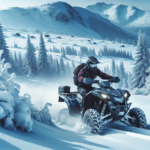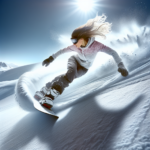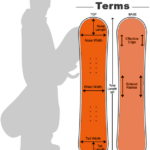You’re blazing trails and carving powder with the best of them – a true snowboarding enthusiast. But wait! News just in: you’re pregnant. Naturally, the question burning in your mind is, “Can I snowboard while pregnant?” This thought-provoking article explores the potential risks and rewards, safety precautions, and expert advice on the topic to help you make an informed decision that’s right for you and your unborn precious bundle.
Understanding the Risks of Snowboarding While Pregnant
When faced with the exhilarating prospect of snowboarding, the obvious question asked by expectant mothers is – can I snowboard while pregnant? But before buckling up the snowboard, it’s crucial to completely understand the risks involved.
Physical Strain and Pregnancy
Snowboarding is a physically taxing sport. It requires you to put significant pressure on your abdominal muscles, something that can be distressing during pregnancy. The strain on your body might lead to unexpected complications, putting both you and your baby at risk.
Possibility of Injuries
The major concern is the possibility of injuries. Snowboarding, like any winter sport, has risks, which might lead to falls or crashes. When not pregnant, these may just amount to a few bruises; however, during pregnancy, these mishaps can turn potentially threatening, increasing the chance of a miscarriage.
Impact of Cold Weather
Icy temperatures, generally uphill, can adversely affect your pregnancy. Frostbite or hypothermia may occur if you aren’t adequately prepared, which can be highly risky for a pregnant woman.
Importance of Early Pregnancy Care
It’s essential to prioritize your health and the well-being of your baby during the early stages of pregnancy. An ideal approach to this would be integrating safer exercise routines, regular medical check-ups, and appropriate nutrition.
Adopting Safer Exercise Routines
Even though you must maintain an active lifestyle during pregnancy, intense sports like snowboarding might not be the best option. Lighter and safer exercises like walking, swimming or prenatal yoga could provide equal benefits but with minimal risks.
Regular Medical Check-Ups
Regular visits to your doctor or midwife can help monitor your health and the baby’s health. It facilitates timely interventions if the need arises, thus being a vital chant to ensure a healthy pregnancy.
Appropriate Nutrition and Hydration
Vital nutrients and hydration are crucial for you and your baby’s development. Make sure your diet has adequate calcium, iron, and vitamins. Regular water intake also helps in nutrients absorption and avoids dehydration.
Recognizing High-Risk Pregnancies
Knowing if your pregnancy is high-risk is essential in making the right decisions, especially when thinking about snowboarding.
History of Miscarriages or Preterm Labor
If you have experienced multiple miscarriages or preterm labor, your pregnancy may be considered high-risk. Thus, engaging in vigorous activities like snowboarding, which might increase your risk of falling, should be reconsidered.
Multiple Pregnancies
Carrying twins or more multiples can be challenging. It’s advisable to avoid demanding physical activities, due to the greater need to conserve energy and manage potential complications.
Existing Health Conditions
Existing health conditions like diabetes, high blood pressure, or respiratory problems could make your pregnancy more complicated. Engaging in high-altitude activities like snowboarding might worsen these conditions.
Considerations Specific to Snowboarding
Some hazards are unique to snowboarding, which makes it more risk-prone, especially for pregnant women.
The Hazard of Falls
Snowboarding carries the risk of frequent falls. Any fall during pregnancy can be potentially harmful, but its severity tends to increase due to the hard, frozen snow surfaces in snowboarding.
High Speed Collisions
Collisions at high speeds with other snowboarders or immovable objects increase the risk of internal injuries, which can pose a grave risk to the growing fetus.
Risk of Altitude Sickness
Snowboarding usually occurs at higher altitudes where the oxygen supply is lesser. Altitude sickness is not only uncomfortable but can also create serious health issues for pregnant women.
Alternatives to Snowboarding While Pregnant
Safe exercise alternatives are available, which can keep you fit without the increased risk of harm.
Lower Impact Winter Activities
Snowshoeing and cross-country skiing are excellent examples of low-impact winter activities. They offer the winter charm without the dangerous elements.
Indoor Fitness Options
Indoor fitness options such as Pilates, swimming, or a stationary bike provide a controlled environment, making them safer for expecting mothers.
Choosing Activities That Promote Relaxation and Mindfulness
Practices like prenatal yoga, meditation, and mindfulness can be extremely beneficial. They enhance not just physical wellbeing but also contribute to mental health, which is equally important for a healthy pregnancy.
Professional Opinions on Snowboarding While Pregnant
Opinions on this topic vary, although most health professionals and experienced snowboarders who have been pregnant themselves recommend against it.
Perspectives from Obstetricians
Most obstetricians advise against any activity that carries a high risk of falling or collision. Snowboarding, due to its intensity and potential risks, doesn’t quite make the cut.
Advice from Physiotherapists
Physiotherapists often promote exercises that improve strength, flexibility, and balance but with low risk. Thus, high-impact sports like snowboarding might not be recommended during pregnancy.
Views from Experienced Snowboarders Who’ve Been Pregnant
Even experienced snowboarders who love the sport have been known to take a break during pregnancy due to the risks involved. The slopes can wait, but your baby’s safety can’t!
Precautions If You Choose to Snowboard While Pregnant
If you decide to continue snowboarding, ensure to take all possible precautions to minimize the risk.
Wearing Protective Gear
An absolute must. Right from your helmet to knee and wrist guards, they’re essential to minimize potential injury from falls or collisions.
Avoiding Difficult Trails
Stick to what feels comfortable and familiar. Avoiding advanced trails reduces the risk of falls.
Staying within Comfortable Limits
Resist the urge to push your limits. Stay within your comfort zone to ensure safety.
Physical Changes During Pregnancy That Affect Snowboarding
Certain physical changes during pregnancy can affect your snowboarding performance and increase the risks.
Shift in Center of Gravity
Pregnancy causes a forward shift in your center of gravity, making your balance precarious. When snowboarding, this might make falls more likely.
Increased Joint Laxity
Pregnancy hormones also lead to an increased joint laxity, which can increase the risk of strain injuries, especially while snowboarding.
Shortness of Breath with Exertion
Carrying an extra load makes you tire out easily. The high altitude where snowboarding occurs can exacerbate this by causing breathlessness.
Along with these physical aspects, the psychological considerations also require attention.
Dealing with Peer Pressure
You might feel pressure from friends to continue snowboarding, but remember, your health and your baby’s health come first.
Managing Fears and Anxiety
Anxiety about the baby’s wellbeing is natural. If snowboarding exacerbates these fears, swap the slopes for safer alternatives.
Balancing Personal Identity and Motherhood
Your identity as a snowboarder might be important, but balancing it with your new role as a mother is essential. Know that giving up snowboarding for some time does not diminish your passion for the sport.
Long-Term Implications of High-Risk Activities During Pregnancy
Engaging in risky activities can have long-term implications.
Potential Impact on Fetal Health
Any injury or illness caused by risky sports might affect fetal health, leading to complications at birth or development issues in children.
Influence on Future Pregnancies
Complications in one pregnancy can impact subsequent ones, making risk minimization crucial.
Risk of Post-Partum Health Issues
Your actions during pregnancy can influence your postpartum health as well. Adopting safer practices can speed up recovery after birth.
In final thoughts, it’s always good to conduct a risk-benefit analysis before deciding on snowboarding while pregnant, mindful of your unique conditions and experiences.
- What Snowboard Bindings Should I Get? - January 23, 2024
- What Size Screws For Snowboard Bindings? - January 23, 2024
- How To Snowmobile On Water? - January 23, 2024










